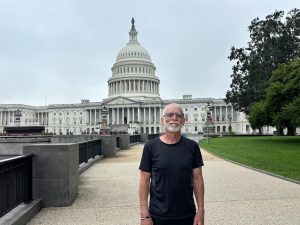A new film that celebrates a pivotal event in Durham’s history has an important asterisk: It wasn’t filmed in Durham.
Set to hit theaters nationwide April 5 after a special showing at the Carolina Theater March 19, The Best of Enemies chronicles the unlikely encounters between civil rights activist Ann Atwater (Taraji P. Henson) and then-KKK leader C.P. Ellis (Sam Rockwell) as they co-chair the committee to desegregate Durham schools in 1971 following a court order.
But while the film tells an important story about Durham, the vast majority of its filming did not take place here. Instead, audiences will see small-town Georgia – the Bartow County Courthouse, Ross’ Diner in Cartersville and the Macon-Bibb Government Center – as stand-ins for the Durham of the early 1970s.
Astute Films, which co-produced The Best of Enemies, found everything it needed in the Atlanta area.
Astute Films’ Harrison Powell told the Atlanta Film Chat podcast that Atlanta’s setup as a “series of small neighborhoods” helps films of all themes and settings make the city work for them. In the case of The Best of Enemies, the small towns of Macon and Cartersville offered both retro-looking architecture (or the potential, with a paint job) and an advantageous location close to the city.
So it was easy to make Durham from scratch.
Durham Mayor Steve Schewel told The 9th Street Journal that the shooting location of the film is less important than the story it will tell.
“I knew Ann Atwater and Claybourn Ellis and had personal relationships which each of them. And I’m very excited that they’re going to be celebrated,” he said.
Moreover, the film’s themes of cross-cultural, cross-racial, and cross-ideological friendship and collaboration tie into Durham’s plans for its sesquicentennial celebration.
“I think it would’ve been nice if it was shot here. [But] this is going to tell a story that the world ought to know. For that I’m very excited,” Schewel said. “I’m excited that it’s Durham’s 150th birthday and it’s really appropriate that the film will be a part of that celebration.”
Hollywood films are all about illusion, of course, and filmmakers go where the tax breaks are.
“It’s not as unusual for a project that may be set in one place to film in another,” said Guy Gaster, director of FilmNC, the state’s film commission. “North Carolina certainly had their fair share of those projects as well, including Three Billboards Outside Ebbing, Missouri which actually filmed in our state and not in Missouri.”
Indeed, North Carolina has brought in major pictures over the years including The Hunger Games, Iron Man 3 and Dirty Dancing. According to a 2014 study, the film industry spent more than $1 billion here between 2007 and 2012, including $58.3 million in tax revenue for the state after tax credits.
But the state’s popularity as a film location has diminished since 2014, when the General Assembly downsized North Carolina’s lucrative tax incentives to a more limited grant program.
Much of the filming business North Carolina may have attracted is now lost to Georgia. In 2008, the Georgia Entertainment Industry Investment Act launched Atlanta into prominence as an entertainment production and industry hub. Today, its film industry ranks just behind Los Angeles and New York. With generous tax credits and write-offs after release, the incentive program is cost-effective for productions while mitigating risk for investors.
Georgia’s incentive policy has a momentous impact on films’ decision to come to the state.
“From what we see, it’s because of those film tax incentives. That’s the biggest factor,” said Emily Murray, a spokeswoman for the Georgia Department of Economic Development.
The film industry’s economic impact in Georgia has soared from $241.5 million in 2007 to $9.52 billion in 2017.
“Film productions bring in business as far as catering, local jobs for stylists, makeup artists, construction workers, electrical workers,” said Murray. “And then while they’re there, they’re sometimes buying hotel rooms, they’re paying the location fees, they’re working with the city to close roads and paying those fees, they’re working with local businesses.”
Gaster of the North Carolina film commission noted that these kinds of ripple effects are among Durham’s losses at not seeing The Best of Enemies filmed in town. But, he said, “Durham will still benefit because the project has been made to look like it is Durham. There’s still the Durham story.”
(Photo at top: An image from the film’s trailer depicts Durham in 1971.)







Comments are closed.